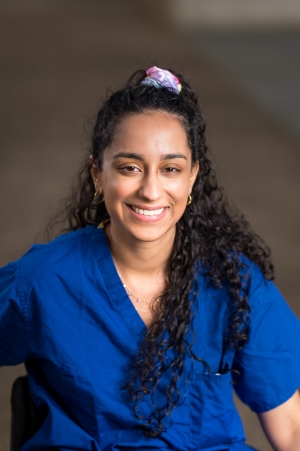
7 November 2025
Could tailored dietary support benefit patients with fibrotic interstitial lung disease (F-ILD)? New research from Royal Brompton hospital suggests it might.
Led by respiratory dietitian Rasleen Kahai and respiratory consultant Dr Elizabeth Renzoni, the study highlights how personalised nutritional care could positively impact patients living with F-ILD.
Lung scarring and weight loss
F-ILD is a term used for a group of diseases that can cause scarring of the lungs. Those living with the condition often experience unintentional weight loss due to a combination of physiological, psychological, and treatment-related factors.
In addition to patients’ lungs working harder and burning more energy, the anti-fibrotic medications prescribed to these patients cause side effects which include poor appetite, diarrhoea, nausea and vomiting – all of which contribute to weight loss.
Malnutrition in F-ILD can not only reduce a patient’s eligibility for lung transplant but it can also impact the tolerability of anti-fibrotic medication.
However, although weight loss can be a worrying sign of declining health, it's not clear whether improving diet could help, and research into treatment of malnutrition in F-ILD is limited.
The feasibility study
The aimed to determine whether it’s possible to run a larger trial to see if a special diet can help these patients.
Forty patients with F-ILD who were underweight or losing weight were invited to take part and were randomly assigned to receive either dietary support for 12 weeks or were provided with standard care, which is a basic information sheet about diet.
The aims of the study were to assess whether patients gained weight, as well as determine whether patients would agree to take part and stay in the study.
The study found that 42% of people in the diet support group gained at least 1 kg, compared to only 5% in the information sheet group.
The research team also successfully recruited enough people and all participants remained enrolled until the end.
On average, people in the diet group gained weight over time, while those in the information sheet group lost a little.
What next?
Rasleen’s pilot study offers hope for patients with F-ILD, showing that dietary support could help reverse weight loss and improve quality of life, while proving a larger trial is feasible. She explained:
“Malnutrition occurs when the body doesn’t get the right nutrients, and up to a third of hospital patients are at risk. This can leave people feeling weak and unable to live a normal life.
“Surprisingly, there has been little research into whether dietetic care can help patients with ILD. That’s why I’m delighted our pilot study shows dietetic support may reverse weight loss and improve quality of life. I’m deeply grateful to Professor Elisabetta Renzoni for her invaluable support and mentorship.”
The study was funded by the Royal Brompton and Harefield Charity.
To find out more about our research, please contact us.
Read more research stories or sign up to the research newsletter.
